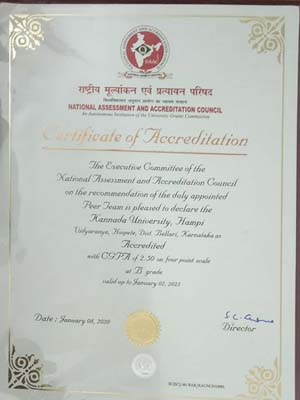About Us
INTRODUCTION (Naac Third Cycle)
Kannada University is established through the Kannada University Act, 1991. The primary objective of the University is to conduct multidisciplinary and interdisciplinary research on various aspects of Karnataka and Kannada. In terms of language, jurisdiction, programs and definition of knowledge, it is a unique University.
The Univer sity’s uniqueness is captured perfectly by the observations of the first NAAC team when it made the following observations: “The objectives were clearly spelt out in Chapter II of the Kannada University Act. We quote only some of them in order to remind ourselves that this University is a special kind of institution, and stands far apart from a conventional university. We as a Peer Team, face a peculiar kind of dilemma when we come to assess and accredit such a monolingual, regionally focused and research-oriented University. The component of teaching- learning transaction is much less here compared to other conventional universities.”
sity’s uniqueness is captured perfectly by the observations of the first NAAC team when it made the following observations: “The objectives were clearly spelt out in Chapter II of the Kannada University Act. We quote only some of them in order to remind ourselves that this University is a special kind of institution, and stands far apart from a conventional university. We as a Peer Team, face a peculiar kind of dilemma when we come to assess and accredit such a monolingual, regionally focused and research-oriented University. The component of teaching- learning transaction is much less here compared to other conventional universities.”
The notes of the second NAAC peer-team that assessed the institution substantiates the above observations of the first peer-team further when it noted that “Kannada University is located in rural area and is a monolingual unitary research University which has jurisdiction in the entire state of Karnataka. Though primarily meant to be a research based university in Kannada language and literature it has broadened its activities adopting some socially relevant programs through faculty of social sciences”.
Vision of the University
To be a premier institute in the world specializing in Karnataka Studies To Produce and disseminate knowledge in Kannada and on Karnataka
To explore the diverse ethos and culture of Karnataka and sustain it as a pluralistic society
Mission Statement
To promote multi-disciplinary research in Kannada on culture, society, economy and polity
To make research materials (both discursive as well as material) available to scholars of Karnataka Studies
To study the linguistic (textual, oral, performative and discursive) practices of the society in general and marginalized communities in particular
To identify multiple knowledge systems with which the communities operate and theorize them To discover, decipher and preserve manuscripts inscribed on leaves, stone and on other materials
To develop theory, method, concept and language to meet the research practices of Kannada research community
To train and promote the spirit of multi-disciplinary research practices among the students
To critically examine and make viable the agricultural, business and other livelihood practices of the communities
To establish academic and community linkages to take the knowledge to society and to bring back the knowledge underlining their practices
To make available research/knowledge in Kannada to both academics and those who are interested through publications, databases and web services
To be a platform for scholars of other institutions who are working in the thrust areas recognized by the university
Strength, Weakness, Opportunity and Challenges(SWOC)
Institutional Strength
Strengths
- Research University located near Hampi, a world heritage site
- University earmarks adequate funds for research
- Flexible institutional structure
- Qualified and experienced faculties
- Green campus with sufficient infrastructure
- Jurisdiction of the University spreads beyond district and state
- Pro lower strata approach both in production and dissemination of knowledge
- University produces and disseminates knowledge in peoples language
- Our outreach programs reach the un-reached and under reached people
Institutional Weakness
Weaknesses
- Insufficient internal revenue generation
- Weak marketing of the University programs
- Limited collaboration with national and international institutions
- No Students from other States and Nations
- Limited human resources
- Lesser engagement with English Language
Institutional Opportunity
Opportunities
- Possibility of transforming into a premier research university
- Creating Data bank of traditional knowledge
- Projects attracting tourists such as heritage village, native medicine could be taken up
- Cultural goods & services produced by the University could be marketed in the national and
international market
- Introducing employment oriented short duration courses
- Green and vast campus could be used to generate revenue
Institutional Challenge
Challenges
- Standardization in areas of research, syllabus and other academic practices pose a big
- Challenges of negotiating opposite demands of market and aspirations of people without purchasing power
- Searching for internal sources of revenue generation
- Challenges of creating demand for the existing degrees and starting courses which have ready demand in the market.
- Students from economically and socially deprived
University has multi challenges of giving them financial, residential and academic support. However, recently the University has made a lot of efforts to overcome this challenge.
Self Study Report for 3rd cycle Accreditation:
Peer team Report:
NAAC Certificates

